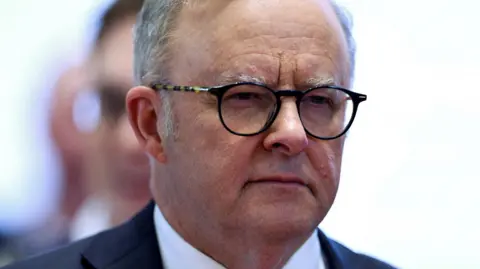James Chater
BBC News, Sydney

 Reuters
Reuters
Australian Prime Minister Anthony Albanese has dismissed concerns that election spending promises could jeopardise the country’s prized AAA sovereign credit rating.
Analysts at S&P Global this week wrote that Australia’s public spending was at “post-war highs”, and warned both major parties that the country’s rating was at risk if savings were not found.
Party leaders have made big spending promises in Australia’s tightly-fought election, scheduled for 3 May – with the cost of living a critical issue for voters.
Speaking to reporters on Tuesday morning, Albanese said that he was proud of his Labor Party’s economic record, adding that he “delivered responsible economic management”.
Earlier, Albanese had said the authors of the S&P report “must have been beside themselves”. He added: “The Coalition left us with a A$78bn ($5bn; £3.7bn) deficit. We turned that into a $2bn surplus.”
Angus Taylor, Australia’s shadow treasurer, wrote on social media that Albanese “mocking the ratings agency shows he’s not fit to lead”.
During Australia’s election campaign, both main parties have pledged billions of dollars for housing, healthcare and energy – aimed at easing cost pressures for citizens.
But the S&P report wrote that “larger, structural deficits”, coupled with more volatility in the global economy, could threaten Australia’s AAA credit rating – the highest tier.
Sovereign credit ratings are an indication of a country’s creditworthiness. The highest rating means a country can borrow at cheaper rates.
Only 11 countries currently have a AAA sovereign credit rating from S&P, including Australia, Germany and Denmark – higher than the US and UK.
Anthony Walker, one of the S&P Global report’s authors, told Sky News Australia that neither party seemed “interested” in raising taxes to fund their spending plans.
“We are seeing tax cuts in the next 12 to 18 months from both parties. So the answer for us is: ‘Is there going to be additional taxes to cover it? Are they going to find internal savings or are they just going to keep debt funding it?'”
The warning came on the same day Albanese’s ruling Labor Party announced costing plans.
If re-elected, the government said it would slash $6.4bn in costs on consultants, and raise $760m by increasing application fees for student visas.








